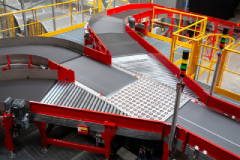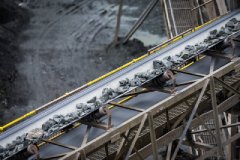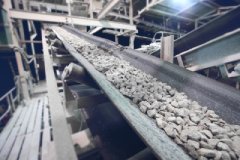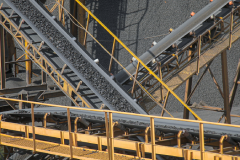A Look at Conveyor Belt Fasteners
Conveyor belt fasteners are pivotal components in the industrial sector, crucial for the maintenance and longevity of conveyor systems. At Davis Industrial, we're not just experts in conveyor systems; we provide solutions that enhance operational efficiency across various industries. This blog dives deeper into the types of conveyor belt fasteners, their applications, and how Davis Industrial's expertise and products can benefit your operations.
What are Conveyor Belt Fasteners?
Conveyor belt fasteners are specialized mechanical devices designed to join the ends of conveyor belts. These fasteners allow for quick, effective repairs, minimizing downtime and enabling continuous operation. Particularly in industries where belt damage is frequent, fasteners offer a cost efficient method for extending belt life and maintaining system efficiency.
Types of Conveyor Belt Fasteners
Fasteners come in various forms, each tailored to meet specific operational demands
Mechanical Belt Fasteners:
Known for their ease of installation and versatility, mechanical fasteners are the go to for rapid repairs. Common types include:
- Bolt Solid Plate Fasteners: Ideal for heavy duty applications, these fasteners provide robust, durable joints.
- Hinged Fasteners: Best for systems with small pulley diameters, their hinge feature allows the joint to flex around the pulley resulting in a longer lasting splice.
- Wire Hooks: Suitable for light to medium duty belts, wire hooks offer simplicity and efficiency in installation and removal.
- Alligator Lacing: This type of fastener provides a continuous, smooth joint that is ideal for lighter duty belts in packaging or food processing industries. The metal lacing is designed to be low profile, reducing the risk of snagging or catching on fine materials.
- Rivet Fasteners: These fasteners are versatile and robust, suitable for mining, wood, and other heavy duty applications. They feature a plate that rivets directly into the belt, offering a strong, reliable hold that withstands tough conditions and heavy impact.
- Screw Fasteners: A flexible rubber splice that screws onto the belt, offering a strong, durable, and quick repair solution for various industrial applications.
Applications of Conveyor Belt Fasteners in Different Industries
Fasteners play a crucial role in various industries, ensuring the efficiency and reliability of conveyor systems:
- Aggregates, Mining, & Cement: Heavy duty fasteners are indispensable in these sectors, where conveyor belts face extreme stress and harsh environments.
- Agriculture: Fasteners are vital for the seamless operation of grain handling and processing equipment, ensuring continuous and efficient workflow.
- Aluminum Extrusion: Reliable fasteners maintain the smooth operation of belts used in the extrusion process, which is essential for consistent production.
- Airports: Ensuring efficient baggage handling systems, and fasteners helps maintain the smooth movement of conveyor belts in airports.
- Box, Paper, & Carton: In packaging industries, fasteners ensure the reliable operation of conveyor systems handling boxes, paper, and cartons.
- Building Materials Manufacturing: Fasteners are essential for the heavy duty belts used in transporting building materials.
- Bulk Marine & Rail Terminals: Fasteners maintain the reliability of conveyor systems that handle large volumes of bulk materials at marine and rail terminals.
- Construction & Roads: Fasteners ensure the efficient operation of conveyor belts used in the construction and roadbuilding industries.
- Distribution, Warehouse, & Package Handling: Fasteners ensure smooth and reliable operations in fast paced sorting and packaging lines, minimizing downtime and maintaining productivity.
- Food & Beverage: Stainless steel fasteners are essential in this industry to meet stringent hygiene standards and prevent contamination.
- Laundry & Textile: Fasteners maintain the efficiency of conveyor systems used in the laundry and textile industries.
- Mobile & Rental Equipment: Fasteners ensure the reliability and efficiency of conveyor systems used in mobile and rental equipment applications.
- Pharmaceutical & Cosmetics: Fasteners that resist chemical corrosion are crucial in these industries to ensure safe and efficient operations.
- Power Generation: Fasteners help maintain the reliability of conveyor belts used in power generation, ensuring the smooth transport of materials.
- Recycling: Fasteners are essential in recycling plants, ensuring the efficient operation of belts that handle various recyclable materials.
- Theme Parks: Fasteners maintain the reliability of conveyor systems used in theme park attractions and rides.
- Wastewater: Fasteners are crucial for efficiently operating conveyor systems in wastewater treatment plants, and handling various waste materials.
- Wood, Pulp, & Paper: Fasteners ensure the reliable operation of conveyor belts used in transporting wood, pulp, and paper products.
Benefits of Using Conveyor Belt Fasteners
Quick and Easy Installation: Mechanical fasteners reduce downtime significantly with ease of installation, which is crucial in high demand industries.
Versatility: A wide range of fastener types allows for effective application across different belt sizes, materials, and operational conditions.
Cost Effectiveness: Fasteners are a more economical solution compared to belt replacement, offering quick fixes that extend the life of the conveyor belt.
Durability and Reliability: Designed to endure industrial rigors, high quality fasteners ensure reliable, smooth operations.
Choosing the Right Fastener
Selecting the ideal fastener for your conveyor belt system is critical to ensure optimal performance, longevity, and safety. Several factors must be considered:
- Application: The specific use case of the conveyor belt significantly influences the choice of fastener. Different applications, such as mining, food processing, or packaging, have unique demands and operational conditions that dictate the type of fastener needed.
- Belt PIW (Pounds per Inch of Width): This measurement indicates the strength of the belt. The fastener must be compatible with the belt's PIW rating to ensure it can withstand the operational stresses without failure. Higher PIW ratings require stronger, more robust fasteners.
- Belt Thickness: The thickness of the conveyor belt is crucial in determining the appropriate fastener. Thicker belts may require fasteners with longer legs or more robust designs to penetrate and secure the belt ends properly.
- Minimum Pulley Diameter: The diameter of the smallest pulley in the conveyor system affects the type of fastener that can be used. Fasteners must be flexible enough to bend around the pulley without causing damage to the belt or the splice. Smaller pulley diameters typically require more flexible fasteners.
Operating Conditions: Environmental factors such as temperature, humidity, and chemical exposure can affect fastener performance.
- Temperature: High temperature environments require fasteners that can withstand heat without degrading.
- Humidity: Corrosion-resistant fasteners, such as those made from stainless steel, are necessary in damp or wet conditions.
- Chemical Exposure: Industries dealing with chemicals need fasteners that resist corrosion and maintain their integrity.
Load and Tension: The operational demands, including the load capacity and tension of the belt, are critical in choosing the right fastener. The fastener must be able to withstand the forces exerted by the conveyed materials without slipping or breaking.
- Load Capacity: Heavy loads require durable fasteners that can handle the stress without compromising the belt’s integrity.
- Belt Tension: High tension applications, such as in mining or quarrying, need fasteners that can maintain a secure hold under significant strain.
Frequency of Maintenance and Accessibility: Consider how often the belt will need to be maintained or replaced. Hinged fasteners, for example, are ideal for systems that require frequent maintenance, allowing easy access and resecuring.
- Maintenance Frequency: Frequent maintenance needs favor fasteners that are easy to install and remove, minimizing downtime.
- Accessibility: In confined spaces, fasteners that are easy to install with minimal tools are preferable.
Application Specific Requirements: Some industries have unique needs that influence fastener selection. For example, the food industry requires fasteners that comply with food safety standards, while the mining industry demands highly durable fasteners to handle abrasive materials.
- Food Safety Standards: Stainless steel fasteners are often required to prevent contamination.
- Durability: In harsh environments, such as those found in mining, fasteners must be extremely durable and resistant to wear and tear.
At Davis Industrial, we not only supply a wide array of fasteners but also bring our comprehensive expertise to ensure you choose the perfect solution for your needs. Whether your industry spans from mining to food, Davis Industrial's conveyor service provides reliable, cost effective solutions tailored to your conveyor system's maintenance needs. With our extensive inventory and expert support, we ensure that your operations remain uninterrupted and efficient. Choose Davis Industrial for top tier service and products that keep your systems running at their best.







